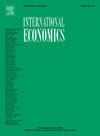Financial development, disaggregated oil shocks, and renewable energy consumption
引用次数: 0
Abstract
This study examines the influence of disaggregated oil shocks and varying levels of financial development on renewable energy consumption (REC). Utilizing both a panel model and a threshold model, we capture the linear and nonlinear dynamics of this relationship. The results of the panel model show that, in oil rich economies, REC remains largely unaffected by oil shocks, with past REC levels being the primary driver. In non-oil rich economies, the level of financial development has a positive and significant impact on renewable energy consumption. The results of the panel model for combined economies highlight the importance of financial development in reducing the effect of oil shocks on renewable energy consumption. The threshold model further reveals that economies react differently to oil shocks based on the level of financial development. This study offers valuable insights for policymakers seeking to strengthen financial development as a way to complement the adoption of renewable energy.
金融发展、石油冲击和可再生能源消费
本研究考察了分类石油冲击和不同金融发展水平对可再生能源消费(REC)的影响。利用面板模型和阈值模型,我们捕捉到这种关系的线性和非线性动态。面板模型的结果表明,在石油资源丰富的经济体中,REC基本上不受石油冲击的影响,过去的REC水平是主要驱动因素。在非石油资源丰富的经济体中,金融发展水平对可再生能源消费具有积极而显著的影响。综合经济体面板模型的结果强调了金融发展在减少石油冲击对可再生能源消费的影响方面的重要性。阈值模型进一步揭示,经济对石油冲击的反应因金融发展水平的不同而不同。这项研究为寻求加强金融发展作为可再生能源采用补充方式的政策制定者提供了有价值的见解。
本文章由计算机程序翻译,如有差异,请以英文原文为准。
求助全文
约1分钟内获得全文
求助全文
来源期刊

International Economics
Economics, Econometrics and Finance-Economics, Econometrics and Finance (all)
CiteScore
6.30
自引率
0.00%
发文量
74
审稿时长
71 days
 求助内容:
求助内容: 应助结果提醒方式:
应助结果提醒方式:


